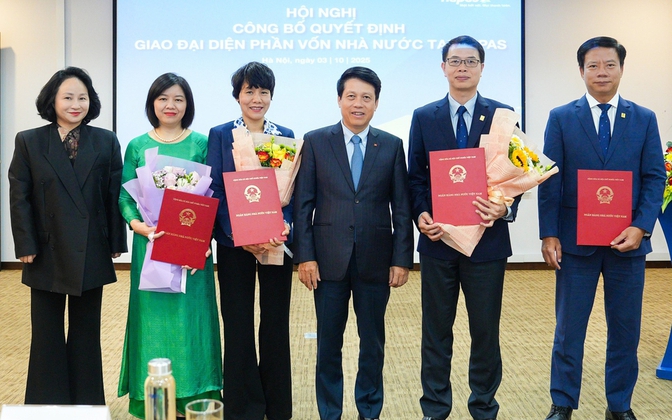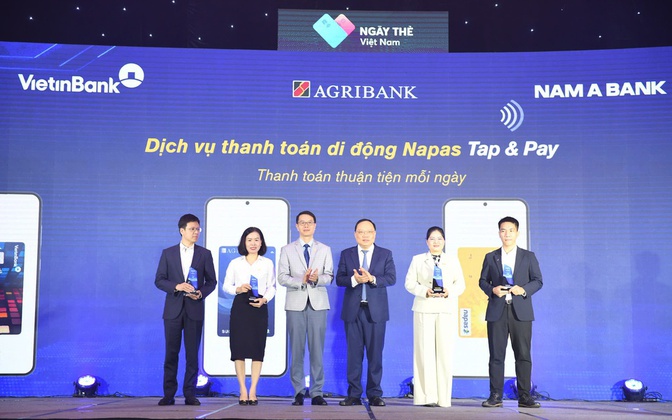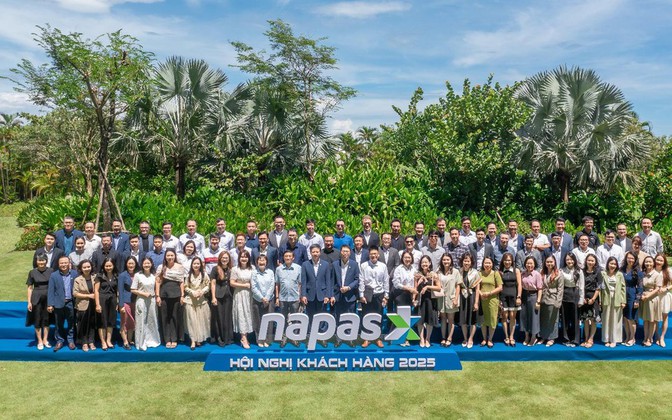On the afternoon of May 8, 2024, at the seminar "Expanding Connections and Developing the Digital Ecosystem" within the framework of the Banking Digital Transformation 2024 event held at the National Convention Center, the Vietnam National Payment Corporation (NAPAS) presented "Common Open Banking Infrastructure - a platform to expand connections and develop the digital ecosystem". This represents a shift from the traditional banking business model to open banking, aiming to provide an optimal customer experience and enhance the competitiveness and efficiency of organizations in the financial sector.
The seminar was attended by Mr. Phạm Tiến Dũng, Deputy Governor of the State Bank of Vietnam (SBV), representatives from the Payment Department, the Information Technology Department, the Communications Department, the Banking Times, and leaders from technology and financial banking units. From NAPAS, the participants included Mr. Nguyễn Quang Hưng (Chairman of the Board), Mr. Nguyễn Quang Minh (CEO), Mr. Nguyễn Hoàng Long (Deputy CEO), and other relevant staff.
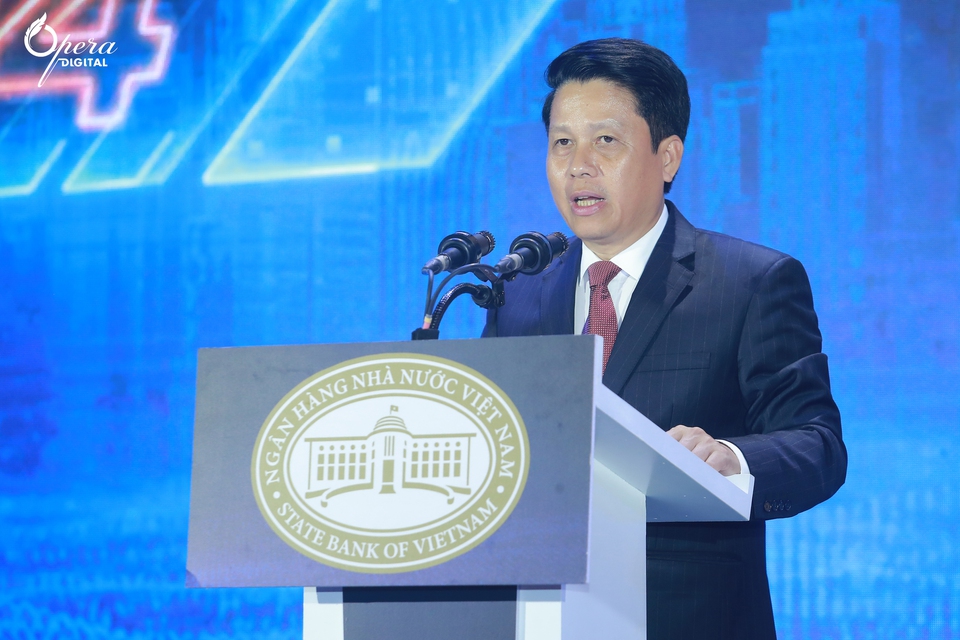
Deputy Governor of the State Bank of Vietnam Phạm Tiến Dũng Speaks at the Banking Digital Transformation 2024 Event
The theme of this year’s Banking Digital Transformation event is "Expanding Connections and Developing the Digital Ecosystem" - continuing from the theme "Application of Citizen Data in Banking Activities - A Driving Force for Digital Transformation" of the 2023 Banking Digital Transformation Day. This theme underscores the banking sector’s determination to effectively implement the tasks outlined in the Digital Transformation Plan for the Banking Sector to 2025, with an orientation towards 2030 (Decision 810/QD-NHNN dated May 11, 2021), Project 06 of the Prime Minister (Decision 06/QD-TTg dated January 6, 2022, of the Prime Minister approving the project for the development of applications of population data, identification, and electronic authentication to serve the national digital transformation for the period 2022-2025, with a vision to 2030), as well as Coordination Plan 01/KHPH-BCA-NHNN between the Ministry of Public Security and the State Bank of Vietnam; and contribute to realizing the goals in the "National Digital Transformation Program to 2025, orientation to 2030" (under Decision 749/QD-TTg of the Prime Minister), aiming towards a digital economy and digital society.
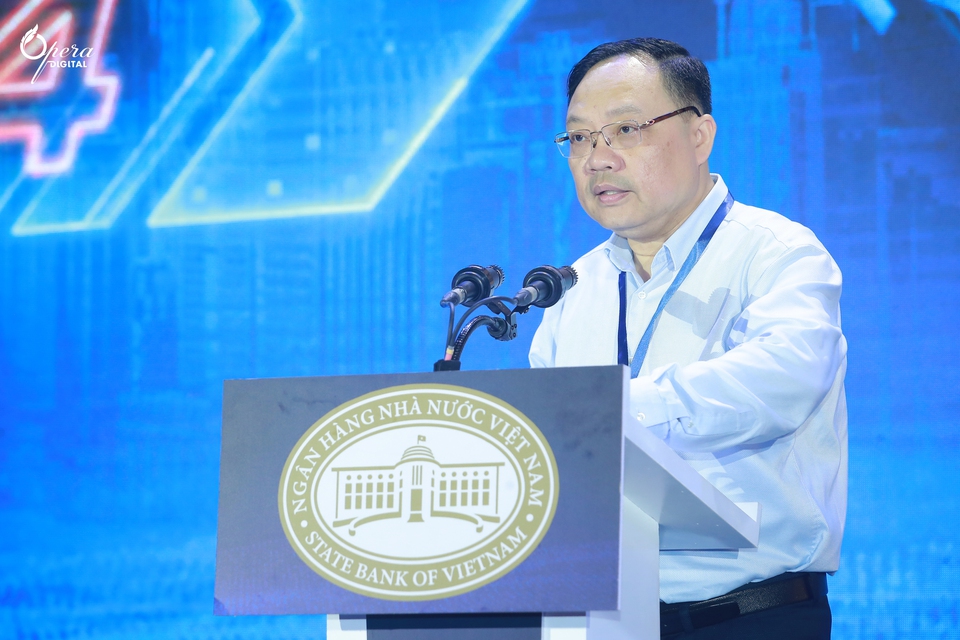
Director of the Payment Department Phạm Anh Tuấn at the "Expanding Connections and Developing the Digital Ecosystem" Seminar
Regarding developing the digital ecosystem, Mr. Nguyễn Hoàng Long, Deputy CEO of NAPAS, shared insights on global trends in implementing Open Banking and the practical implementation in Vietnam.

Mr. Nguyễn Hoàng Long (Deputy CEO of NAPAS) presented on "Common Infrastructure for Open Banking - a Platform for Expanding Connections and Developing the Digital Ecosystem."
Accordingly, Open Banking is a model that connects and processes open application programming interfaces (Open APIs), allowing third-party providers (TPPs) to access customers’ banking information with their consent. Currently, the trend of common infrastructure for Open Banking is increasing worldwide. This common infrastructure helps promote faster development compared to spontaneous connections and is operated or licensed by reputable organizations/associations. Examples include India (UPI/NPCI), South Korea (KFTC), and Switzerland (Six Group), which are supported by central banks and banking/fintech associations, or the model in the UK, which is licensed by the FCA and supported by the CMA and the central bank.

Common Infrastructure for Open Banking Will Bring Many Practical Benefits
According to research by the open financial technology and consulting service provider Konsentus, 68 countries have developed or are developing Open Banking. Open Banking services have developed significantly in Asia in South Korea, Hong Kong, Singapore, Japan, and more.
In Vietnam, banks are also actively advancing the digital transformation process by sharing banking data with third-party providers (TPPs) through the use of Open APIs. Since 2020, numerous banks have joined the development of this model: Vietinbank, BIDV, OCB, MB, and others. For instance, VietinBank launched the VietinBank iConnect application in 2019. According to statistics, over 55 million financial transactions are conducted through this platform each month. Similarly, BIDV’s BIDV Open API application, introduced on November 29, 2023, offers 15 API packages with four main service groups: Payment Services, Collection Services, Online Payments, and Utilities (Bank Information, BIDV QRcode).
"However, banks and TPPs are currently independently seeking and selecting suitable connection partners based on their needs and interacting directly for integration and implementation. They also customize connections based on specific requirements and agreements between the two parties. The implementation process between parties faces many challenges. Each bank must develop and operate its standards and connections, increasing operational costs and consuming resources. Banks must carry out the entire implementation process with TPPs: from KYC, onboarding, and technical connections. TPPs use various standards and connect with multiple banks. Each connection requires reviewing and operating different legal documentation sets. Banks open many connections to TPPs without unified data security standards," Mr. Long shared.
As stated by Mr. Long, common infrastructure for Open Banking will bring many practical benefits. Customers will experience optimized service, access to a wider range of information and services, quick handling of financial needs, personalized services, secure data sharing, more incentives, and reduced costs. For banks and fintech companies, common Open Banking infrastructure will simplify legal implementation, reduce security risks, save costs and resources, increase service expansion capabilities, provide more opportunities to reach customers and enable cross-selling of products and services.
For regulatory agencies, common Open Banking infrastructure also facilitates market supervision, promotes the digital ecosystem, supports the policy of developing a digital economy, and creates a foundation for the growth of open finance.
A representative of NAPAS stated: "Soon, with the collective effort of the entire market and under the guidance of the State Bank of Vietnam, the implementation of Open Banking will bring numerous benefits to customers and contribute to the digital transformation process of the banking sector. Payment infrastructure providers like NAPAS are also ready, preparing the necessary facilities and services to support banks and third-party service providers on the Open Banking infrastructure, to implement solutions and develop technical standards for applications in the non-cash payment sector, fostering innovation and enhancing customer experience; improving the efficiency of the digital transformation process."
"Alongside this, NAPAS is also developing digital payment infrastructure to meet the current and future demands of digital transformation in the payment sector. We are developing multi-channel, multi-media products to support public service payments in education, healthcare, public transportation, and other market needs," Mr. Long added.
These activities demonstrate NAPAS’s determination to drive digital transformation in Vietnam’s banking sector, ensuring it meets the real needs of customers and partners and keeps pace with global trends. Moving forward, to promote the development of the payment market, NAPAS aims to become the most reliable retail payment network for the government, banks, payment intermediaries, customers, and partners, thereby contributing to the national digital transformation process for the period 2022-2025, with a vision to 2030.



